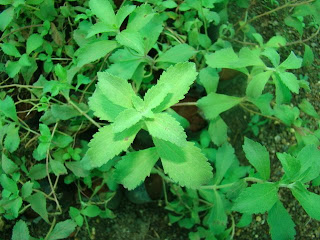
Stevia is a genus of about 150 species of herbs and shrubs in the sunflower family (Asteraceae), native to subtropical and tropical South America and Central America. The species Stevia rebaudiana Bertoni, commonly known as sweetleaf, sweet leaf, sugarleaf, or simply stevia, is widely grown for its sweet leaves. As a sugar substitute, stevia's taste has a slower onset and longer duration than that of sugar, although some of its extracts may have a bitter or licorice-like aftertaste at high concentrations.
With its extracts having up to 300 times the sweetness of sugar, stevia has garnered attention with the rise in demand for low-carbohydrate, low-sugar food alternatives.
Stevia also has shown promise in medical research for treating such conditions as obesity and high blood pressure. Stevia has a negligible effect on blood glucose, even enhancing glucose tolerance therefore, it is attractive as a natural sweetener to diabetics and others on carbohydrate-controlled diets.
History and use
For centuries, the Guaraní tribes of Paraguay and Brazil used Stevia species, primarily S. rebaudiana which they called ka'a he'ê ("sweet herb"), as a sweetener in yerba mate and medicinal teas for treating heartburn and other ailments. The leaves of the stevia plant have 30–45 times the sweetness of sucrose (ordinary table sugar).
Other studies have shown stevia improves insulin sensitivity in rats and may even promote additional insulin production, helping to reverse diabetes and metabolic syndrome.Preliminary human studies show stevia can help reduce hypertension.
Indeed, millions of Japanese have been using stevia for over thirty years with no reported or known harmful effects. Similarly, stevia leaves have been used for centuries in South America spanning multiple generations in ethnomedical tradition as a treatment of type II diabetes.
In Pune this Plant is available with our NGO (MPCC), to get this and other medicinal plants contact Mr. Cruz: 9370139009 or Philip: 9423581047
The Address of the Medicinal Plants Nursery
Queen Mary’s Technical Institute (QMTI), For Disabled Soldiers,
Park Road, Behind Kirkee RLY. STN
Renge Hells, Pune-20
With its extracts having up to 300 times the sweetness of sugar, stevia has garnered attention with the rise in demand for low-carbohydrate, low-sugar food alternatives.
Stevia also has shown promise in medical research for treating such conditions as obesity and high blood pressure. Stevia has a negligible effect on blood glucose, even enhancing glucose tolerance therefore, it is attractive as a natural sweetener to diabetics and others on carbohydrate-controlled diets.
History and use
For centuries, the Guaraní tribes of Paraguay and Brazil used Stevia species, primarily S. rebaudiana which they called ka'a he'ê ("sweet herb"), as a sweetener in yerba mate and medicinal teas for treating heartburn and other ailments. The leaves of the stevia plant have 30–45 times the sweetness of sucrose (ordinary table sugar).
Other studies have shown stevia improves insulin sensitivity in rats and may even promote additional insulin production, helping to reverse diabetes and metabolic syndrome.Preliminary human studies show stevia can help reduce hypertension.
Indeed, millions of Japanese have been using stevia for over thirty years with no reported or known harmful effects. Similarly, stevia leaves have been used for centuries in South America spanning multiple generations in ethnomedical tradition as a treatment of type II diabetes.
In Pune this Plant is available with our NGO (MPCC), to get this and other medicinal plants contact Mr. Cruz: 9370139009 or Philip: 9423581047
The Address of the Medicinal Plants Nursery
Queen Mary’s Technical Institute (QMTI), For Disabled Soldiers,
Park Road, Behind Kirkee RLY. STN
Renge Hells, Pune-20

1 comment:
I agree that Stevia sounds like a great addition to one's diet as a precautionary measure. But, once the metabolic syndrome has started, it is necessary to do even more.
Everything you do - eat a meal, drive to work, even walk around the block - produces metabolic waste and toxins. Your body usually can't eliminate metabolic waste as fast as it is produced. And poor diet, excessive stress, strenuous workouts and pollutants in the air you breathe can increase the rate at which waste builds, creating metabolic imbalance in your system.
Prolonged metabolic imbalance leads to a breakdown of cellular tissue structures and functions, resulting in a condition known as metabolic stress which characterized by a variety of symptoms.
• Trouble focusing on an activity or task
• Moodiness, irritability
• Lack of energy, feeling "run down" or sick
• Difficulty keeping weight down
• Unhealthy cholesterol levels
• Glucose and insulin imbalance
• Build-up of environmental toxins in the body
• Cell damage caused by free radicals that come from oxidative stress
If left unchecked, metabolic stress can develop into full-blown metabolic syndrome, which - according to a recent issue of the Journal of the American Medical Association* (JAMA) - afflicts about 50 million Americans. Metabolic stress and metabolic syndrome are identified as precursors to:
• Obesity
• Heart disease
• Cancer
• Strokes
• Diabetes
• Macular degeneration
Until now, there was no easy way to reduce metabolic stress and bring your body back to metabolic balance.
MeridiumXN from BioNovix is a powerful remedy that acts directly at the molecular level to restore metabolic balance.
Scientific research indicates that the active ingredients in MeridiumXN, when taken daily, can help your body eliminate metabolic waste and may prevent the harmful chemical reactions associated with metabolic stress and metabolic syndrome.
For more info visit www.health-4-u.org
You can even get a FREE 30 day at:
www.freemxn.com
Post a Comment